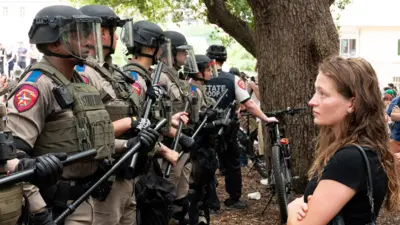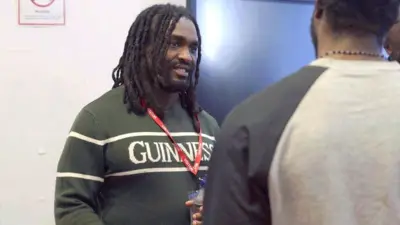We've updated our Privacy and Cookies Policy
We've made some important changes to our Privacy and Cookies Policy and we want you to know what this means for you and your data.
Commuters urged to help stop suicides through small talk
Image source, Small Talk Saves Lives
Commuters are being urged to step in if they see vulnerable people near railway tracks, as part of a campaign to prevent suicide.
Network Rail, British Transport Police (BTP) and Samaritans hope the "Small Talk Saves Lives" campaign will give travellers the confidence to intervene.
BTP Chief Constable Paul Crowther said engaging someone in conversation could "make all the difference".
In 2016/17, 273 people died in suicide incidents on the UK's railways.
Ian Stevens from Network Rail, who manages the industry's suicide prevention programme, said: "Given that nearly five million journeys are made by train every day, we are asking for passengers to work alongside our staff as the eyes and ears of the railway, helping us to keep everybody safe."
A survey of 5,000 people carried out by the campaign group showed 83% of passengers would approach someone who may be suicidal if they knew the signs, what to say and if they knew they would not make the situation worse.
The campaign highlights warning signs, including:
- A person standing alone and isolated
- A person looking distant or withdrawn
- Someone staying on the platform a long time without boarding a train
- Someone displaying something out of the ordinary in their behaviour or appearance.
And when it comes to what to say, the Samaritans said something as simple as a question could break the pattern of suicidal thoughts.
Examples which have saved lives include "It's a warm evening, isn't it?" and "Do you need some help?". Asking someone what their name is or introducing yourself can also get the conversation started.
After asking the initial question, many people said they felt confident to offer reassurance and support those by listening, it added.
Where to get help
Image source, Getty Images
- The Samaritans operate a 24-hour service available every day of the year on 116 123. If you prefer to write down how you're feeling, you can email at jo@samaritans.org.
- Childline runs a helpline for children and young people in the UK on 0800 11 11. Calls are free and the number does not show up on your phone bill.
- PAPYRUS is a voluntary organisation supporting teenagers and young adults who are feeling suicidal. You can call them on 0800 068 41 41.
SOURCE: NHS - for more information click here.
Sarah Wilson planned to take her life on the railway, but did not go through with it after someone spoke to her.
"Someone showing that they cared about me helped to interrupt my suicidal thoughts and that gave them time to subside," she said.
"The more that people understand that suicide is preventable, the better. You won't make things worse, and you could save a life."
While the group was keen to emphasise there was no single sign or combination of behaviours that meant a person was suicidal, it said: "If something doesn't feel right, the message is to act."
If a person does not feel comfortable to talk to someone at risk, the group recommends alerting a member of staff or calling the police.
The Samaritans have trained 16,000 rail staff and BTP officers in suicide prevention and, as a result, for each life lost on the railway, six are saved.
"Suicide is everybody's business and any one of us could have an opportunity to save a life," said Ruth Sutherland, chief executive of the Samaritans.
"We hope that Small Talk Saves Lives is the start of a much wider conversation about how suicide is preventable."
Drop in rail suicides after new Samaritans course
Network Rail staff and transport police attend a suicide-prevention course which helps the vulnerable.
Top Stories
Features & Analysis
Most read
Content is not available








